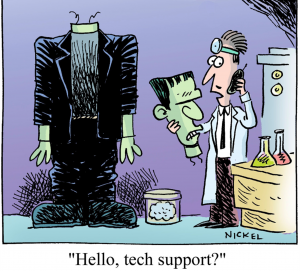October 2022 Newsletter

What Makes A Strong Password? And Why Do I Need One?
Think about some of your private accounts right now. Chances are that you have an e-mail, social media accounts, bank account and more that are all password-protected. Do you share passwords across different accounts, and are your passwords strong enough to keep cybercriminals away from your private information? If not, it might be time to evaluate.
Passwords offer the first line of defence when someone tries to access your sensitive information. Without passwords, anyone could gain access to your social media account, which could provide them with personal information that could harm you. Even worse, bank accounts would be easily accessible to cybercriminals who are hoping to rob you of your funds.
While many personal accounts are password-protected, your business accounts also need to be properly secured. But this doesn’t just exclusively apply to you – it
needs to be understood on a companywide level. Every employee needs to use passwords to keep sensitive business information secure. Think about the damage a cybercriminal could do to your business if they gained access. They would permanently damage your company’s reputation while also putting your employees’ and customers’ private information at risk.
However, it’s not enough to simply put a password in place. The passwords you choose need to be complex. But what makes a password complex? A complex password will utilize a mix of upper and lowercase letters, numbers, punctuation and special characters. Additionally, your password should not be related to any personal information nor should you use dictionary words. Your password should be incredibly difficult for someone to guess, even if they know you well, but you also need to ensure that your password is something you can remember.
In addition to that, even with a complex password, it’s likely still not enough protection. Each of your accounts and devices should have a unique password that hasn’t been used anywhere else. If you use the same password across all accounts and devices, you’re opening yourself up to a pretty extreme cyber-attack if one of your accounts is compromised. All a cybercriminal needs to do is hack your Facebook page, and they will have the password for your bank accounts and e-mail.
You might think that it’d be impossible to remember so many different complex passwords, but software is available that can help. The best way to keep track of your passwords is to use a password manager. With a password manager, you only have to remember one master password, and the software keeps track of the rest. It will even help you create complex passwords for your different accounts to ensure that your information is as protected as possible.
If you oversee a team of employees, then it’s vital that they understand why creating strong passwords is so important. Your team should have trainings on cyber security practices, including information on creating passwords. If just one employee fails to create a complex and unique password, it could open you up to a cyber-attack.
Creating strong passwords does not have to be difficult. If you’re struggling to remember or create strong passwords, use a password manager. Strong passwords will help keep your sensitive information protected.
Holding Your Team Accountable
Leaders often fail to hold their team accountable. During research for our book, Powerscore, we found that only 8% of leaders are good at holding people accountable. One of the main reasons that leaders fail in this area is because when it’s done wrong, it makes things more difficult for everyone.
Here’s an example: I was giving a keynote speech at a Fortune conference a few years back and asked the audience, “How many of you have goals for your teams that are written down?” Only 10% raised their hands. Failure to write down goals opens up the door for confusion. It becomes nearly impossible to hold someone accountable for delivering a result when you have failed to articulate what you’re looking for.
In order to hold your team accountable, you need to be specific with goals and use numbers that others provide to measure performance. When I was still a young CEO with ghSMART, I struggled to hold a consultant accountable. She was brilliant and had great technical skills but failed to call clients proactively and didn’t follow up with them. Many clients did not ask for her to come back as their trusted advisor.
I called her into my office and told her that she needed to work on her client relationships. She disagreed and stated that her clients loved her work. I said, “Well, one client told me that although he values your work, he feels you treat him like ‘processed cheese’ and that you rush to finish projects with him and then you move on to your next client project.” She said that her work spoke for itself, and the meeting abruptly ended.
This was a huge failure on my part as I failed to set specific, mutually agreed on goals and used vague wording. I talked about this with a mentor and he said, “Make sure you have clear goals, in writing, so your consultants know what ‘great’ looks like. Then have somebody other than you collect data on their performance. Then you can sit down as a coach to review their results
vs. their goals.”
It was great advice that I immediately put into practice. When you properly hold people accountable, high performers will know they are performing, and they will keep doing what they are doing. And lower performers will know they are not performing well, long before anybody has to sit them down to have a conversation.

Leave An Impression On Your Employees And Customers With The Proper Gratitude
How many times do you thank people every day? When a customer buys a product or service from you, you probably say, “Thanks for shopping with us. Please come again!” When a team member completes a task or helps out in any way, you probably also thank them.
But are your thanks to customers and coworkers being received as well as you hope? In a time when competitors are right down the street and employees are looking for a company culture that suits their needs, gratitude becomes ever more critical.
It’s essential that you work on your thanking skills so your gratitude is well received. You can do three things when thanking someone to make sure your appreciation leaves an impression: always use their name so that they feel personally acknowledged, include what you are specifically thanking someone for and thank people as soon as possible. When your thanks are personalized, specific, and prompt, they mean much more to the person receiving them.
Make Your Meetings More Productive
You’re probably in meetings every day if you’re a business owner. They can quickly become time-consuming if there is not a solid plan beforehand. If you are always leading meetings, here are a few things you can do to ensure they are as productive as possible.
- Invite only the necessary individuals and teams to the meeting. There’s no point in having every employee attend every meeting.
- Create an agenda to keep your meeting from coming off the rails. Send the agenda to the relevant people before the meeting and make it conversational with a step-by-step plan.
- Set a start and end time to keep your day on track. This will tell your employees that you believe their time is valuable.
- Set the time for the meeting when everyone will be alert and ready to discuss the topic at hand. Also, utilize a note keeper so your team can reflect later on what was discussed in case they miss something.
- Set deadlines and create an action plan for your team during the meeting. This sets up accountability so you can ensure everyone will pay attention and play their part



You must be logged in to post a comment.